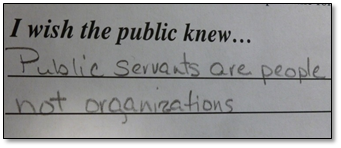
fotoandrius/Shutterstock.com
Hear What Federal Employees Have to Say to ‘I Wish the Public Knew . . .’
Reflections for Public Service Recognition Week.
Third-grade teacher Kyle Schwartz wanted to better understand her students many of whom came from impoverished homes. So she asked. She requested her students complete the sentence “I wish my teacher knew . . .” The colorful, hand-written responses ranged from heartwarming to heartwrenching. The comments were poignant and powerful; reflecting love -- “I wish my teacher knew that I feel safe around you” as well as loneliness --“I wish my teacher knew I don’t have a friend to play with me.”
Enlightened by this reality check, Schwartz posted the responses on Twitter (hashtag: #IWishMyTeacherKnew) to educate other teachers of the challenges confronting today’s students.

Her initiative prompted the Cardinal Community Schools Superintendent, Joel Pedersen, to enlist other teachers to join the project. “My hope for this,” he said, “is that as educators, we can step back and realize that we may not always know the whole story of what our children are facing.”
Hearing of Schwartz’s initiative, I wondered whether, as an educator, I knew the whole story of my students: senior-level government employees attending the Federal Executive Institute in Charlottesville, Virginia. Although they work inside the glass house of public service, I wanted to learn how their perception of reality differed from the public and media who look in from the outside. I wanted to better understand the challenges they are facing. So I asked.

I invited recent graduates of the Leadership for a Democratic Society Program to complete the sentence “I wish the public knew . . .” The outpouring of responses was immediate, insightful and inspiring. With few exceptions, the comments fell into five categories: people, purposefulness, perseverance, perception and pay. A sampling of these compelling comments follows.
People
Epitomizing Abraham Lincoln’s immortal words, federal employees see themselves as part of a government “of the people, by the people, for the people.” They serve the people and are people.
. . . public servants are people, not organizations.
. . . I am the "public" too, and I have the same or higher expectations of the public servants as they do; especially when it impacts the security of our country.
. . . being a public servant doesn't make one immune to needs or desires of other humans.
. . . at the end of the day, it is all about relationships. Public servants know this. If not for their commitment to others, they would not serve.
Purposefulness
Federal employees take extreme pride in their vocation and the meaningfulness it provides in return. They revel in tackling tough work assignments, especially when championing a worthy cause.
. . . public servants view their work as a calling, not a job.
. . . we are like the engine of a car: we make things run so they can spend their time driving to new places.
. . . I have a government job because I want this great country to flourish and be a better place for my children.
. . . public servants are interested, caring, and engaged in the needs of others. Because of this, they don't view putting the needs of others before themselves or their family as a sacrifice. It simply is the way it is. It will not change because it is not an event, it is a lifestyle.
Perseverance
Despite multiple rigors and limited recognition, federal employees persist in their pursuit of a “greater good.”
. . . we are people of integrity. We work long and hard hours.
. . . federal employees work hard, and in many of their tasks and roles will never interface with the public they serve. They are dedicated even though those they work for will never be able to say thanks.
. . . how hard federal servants work to assure their safety, their security, and the good stewardship of taxpayer’s dollars.
Perception
Public servants want to be more accurately portrayed by the media, and thus better understood by the public. Not seeking to soften or spin the news, they appeal for a more balanced portrait that illustrates the government’s successes, not solely its shortfalls.
. . . how truly committed to public service the majority of federal employees really are. That what they read on the news is the exception, not the norm.
. . . for every failed project covered by the media, there are tens of thousands of successful ones that don’t get coverage.
. . . how hard it is to implement a program while balancing all the public interests.
Pay
Public servants perceive themselves as members of a highly productive workforce, fueled by passion and purposefulness rather than pay or profit.
. . . I work with a lot of talented, high-achieving people who could work anywhere and choose to be here.
. . . when [the public] hired me, it got a fabulous lawyer at a bargain hourly rate . . . I am a highly skilled professional who would rather do great things for my country than make great money in the private sector. I respect deeply my client, the American Taxpayer, and only ask in return for a modicum of respect for the job I do.
. . . I left a job with better pay and benefits to do this.
These candid comments provide an unfiltered glimpse into the reality federal employees face. Taken together, they complete the sentence “I wish the public knew . . .” with the stirring sentiment that the federal workforce is manned by hardworking, dedicated people whose pride and perseverance overcome misperception and disproportionate pay to serve and safeguard the nation.
One respondent warned “. . . if the quality of the public servant workforce declines, the nation will decline.” But with these heartfelt responses, such a decline will not come soon.
Celebrating Public Service
In honor of Public Service Recognition Week, the Office of Personnel Management’s Center for Leadership Development is offering federal employees complimentary one-hour webinars on contemporary leadership topics:
May 7 at 1 p.m. -- Leadership Through the Lens of Culture
May 8 at 2 p.m. -- How to Succeed in a Virtual Environment
Michael F. Belcher is a faculty member at the Office of Personnel Management’s Federal Executive Institute. He teaches leadership and change management to federal executives in the Leadership for a Democratic Society Program. He can be contacted at Michael.belcher@opm.gov.
(Image via fotoandrius/Shutterstock.com)






